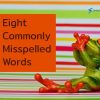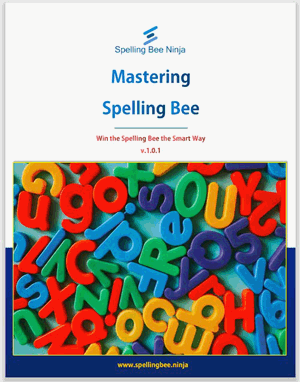Believe it or not, over 60% of the English words have a Greek or Latin origin, and that is why, we present to you the list of Latin spelling words.
English has borrowed words from many languages throughout history, a great deal of which, can be traced back to Latin or French origin. However, there are several other languages that have gone on to influence the English language and vocabulary as well.
Click here to know more about the Latin influence on the English language.
Keeping the Latin influence in mind, we have composed this Latin spelling words list for all you spelling bee enthusiasts. This is a comprehensive list of spelling bee words containing around 150 spellings.
You will find a lot of these words in different spelling bee word lists. Spelling bees like to incorporate words from different languages, origins, and culture. Hence, you are bound to run into one or more of these words at some point during your practice as well as during the competition.
Below, you will find a list of Latin words that have entered the English language. You can also find them in this link. We also prepared the list in pdf and sbn format, just click the icons below to access to the desired version:
Latin Spelling Words
Click on each word to open the Spelling Bee card in another tab.
PDF, Flashcards and SBN formats
Some Latin Spelling Words Definitions
| Abdicate | To surrender or relinquish, as sovereign power; to withdraw definitely from filling or exercising, as a high office, station, dignity; as, to abdicate the throne, the crown, the papacy. – To renounce; to relinquish; — said of authority, a trust, duty, right, etc. – To reject; to cast off. – To disclaim and expel from the family, as a father his child; to disown; to disinherit. – To relinquish or renounce a throne, or other high office or dignity. |
| Access | A coming to, or near approach; admittance; admission; accessibility; as, to gain access to a prince. – The means, place, or way by which a thing may be approached; passage way; as, the access is by a neck of land. – Admission to sexual intercourse. – Increase by something added; addition; as, an access of territory. [In this sense accession is more generally used.] – An onset, attack, or fit of disease. – A paroxysm; a fit of passion; an outburst; as, an access of fury. |
| Adjacent | Lying near, close, or contiguous; neighboring; bordering on; as, a field adjacent to the highway. – That which is adjacent. |
| Affinity | Relationship by marriage (as between a husband and his wife’s blood relations, or between a wife and her husband’s blood relations); — in contradistinction to consanguinity, or relationship by blood; — followed by with, to, or between. – Kinship generally; close agreement; relation; conformity; resemblance; connection; as, the affinity of sounds, of colors, or of languages. – Companionship; acquaintance. – That attraction which takes place, at an insensible distance, between the heterogeneous particles of bodies, and unites them to form chemical compounds; chemism; chemical or elective affinity or attraction. – A relation between species or highe/ groups dependent on resemblance in the whole plan of structure, and indicating community of origin. – A superior spiritual relationship or attraction held to exist sometimes between persons, esp. Persons of the opposite sex; also, the man or woman who exerts such psychical or spiritual attraction. |
| Alleviate | To lighten or lessen the force or weight of. – To lighten or lessen (physical or mental troubles); to mitigate, or make easier to be endured; as, to alleviate sorrow, pain, care, etc.; — opposed to aggravate. – To extenuate; to palliate. |
| Alliteration | The repetition of the same letter at the beginning of two or more words immediately succeeding each other, or at short intervals; as in the following lines: – |
| Ambiguity | The quality or state of being ambiguous; doubtfulness or uncertainty, particularly as to the signification of language, arising from its admitting of more than one meaning; an equivocal word or expression. |
| Ambivalent | Having mixed feelings or contradictory ideas about something or someone. |
| Ameliorate | To make better; to improve; to meliorate. – To grow better; to meliorate; as, wine ameliorates by age. |
| Amicable | Friendly; proceeding from, or exhibiting, friendliness; after the manner of friends; peaceable; as, an amicable disposition, or arrangement. |
| Animosity | Mere spiritedness or courage. – Violent hatred leading to active opposition; active enmity; energetic dislike. |
| Aquatic | Pertaining to water; growing in water; living in, swimming in, or frequenting the margins of waters; as, aquatic plants and fowls. – An aquatic animal or plant. – Sports or exercises practiced in or on the water. |
| Bellicose | Inclined to war or contention; warlike; pugnacious. |
| Belligerent | Waging war; carrying on war. – Pertaining, or tending, to war; of or relating to belligerents; as, a belligerent tone; belligerent rights. – A nation or state recognized as carrying on war; a person engaged in warfare. |
| Benefactor | One who confers a benefit or benefits. |
| Benevolent | Having a disposition to do good; possessing or manifesting love to mankind, and a desire to promote their prosperity and happiness; disposed to give to good objects; kind; charitable. |
| Bugle | A sort of wild ox; a buffalo. – A horn used by hunters. – A copper instrument of the horn quality of tone, shorter and more conical that the trumpet, sometimes keyed; formerly much used in military bands, very rarely in the orchestra; now superseded by the cornet; — called also the Kent bugle. – An elongated glass bead, of various colors, though commonly black. – Jet black. – A plant of the genus Ajuga of the Mint family, a native of the Old World. |
| Canary | Of or pertaining to the Canary Islands; as, canary wine; canary birds. – Of a pale yellowish color; as, Canary stone. – Wine made in the Canary Islands; sack. – A canary bird. – A pale yellow color, like that of a canary bird. – A quick and lively dance. – To perform the canary dance; to move nimbly; to caper. |
| Candidate | One who offers himself, or is put forward by others, as a suitable person or an aspirant or contestant for an office, privilege, or honor; as, a candidate for the office of governor; a candidate for holy orders; a candidate for scholastic honors. |
| Canine | Of or pertaining to the family Canidae, or dogs and wolves; having the nature or qualities of a dog; like that or those of a dog. – Of or pertaining to the pointed tooth on each side the incisors. – A canine tooth. |
| Capitulation | A reducing to heads or articles; a formal agreement. – The act of capitulating or surrendering to an emeny upon stipulated terms. – The instrument containing the terms of an agreement or surrender. |
| Capricorn | The tenth sign of zodiac, into which the sun enters at the winter solstice, about December 21. See Tropic. – A southern constellation, represented on ancient monuments by the figure of a goat, or a figure with its fore part like a fish. |
| Carnivore | One of the Carnivora. |
| Cognition | The act of knowing; knowledge; perception. – That which is known. |
| Colloquial | Pertaining to, or used in, conversation, esp. Common and familiar conversation; conversational; hence, unstudied; informal; as, colloquial intercourse; colloquial phrases; a colloquial style. |
| Commensurate | To reduce to a common measure. – To proportionate; to adjust. – Having a common measure; commensurable; reducible to a common measure; as, commensurate quantities. – Equal in measure or extent; proportionate. |
| Condolences | An expression of sympathy, especially on the occasion of the death of a person’s relative or close friend. |
| Conjecture | An opinion, or judgment, formed on defective or presumptive evidence; probable inference; surmise; guess; suspicion. – To arrive at by conjecture; to infer on slight evidence; to surmise; to guess; to form, at random, opinions concerning. – To make conjectures; to surmise; to guess; to infer; to form an opinion; to imagine. |
| Consensus | Agreement; accord; consent. |
| Contiguous | In actual contact; touching; also, adjacent; near; neighboring; adjoining. |
| Corporal | A noncommissioned officer, next below a sergeant. In the United States army he is the lowest noncommissioned officer in a company of infantry. He places and relieves sentinels. – Belonging or relating to the body; bodily. – Having a body or substance; not spiritual; material. In this sense now usually written corporeal. – Alt. Of Corporale |
| Corpuscle | A minute particle; an atom; a molecule. – A protoplasmic animal cell; esp., such as float free, like blood, lymph, and pus corpuscles; or such as are imbedded in an intercellular matrix, like connective tissue and cartilage corpuscles. See Blood. |
| Credentials | A qualification, achievement, quality, or aspect of a person’s background, especially when used to indicate their suitability for something. |
| Credible | Capable of being credited or believed; worthy of belief; entitled to confidence; trustworthy. |
| Curriculum | A race course; a place for running. – A course; particularly, a specified fixed course of study, as in a university. |
| Dejected | Cast down; afflicted; low-spirited; sad; as, a dejected look or countenance. – To cast down the spirits of; to dispirit; to discourage; to dishearten. – Dejected. |
| Diary | A register of daily events or transactions; a daily record; a journal; a blank book dated for the record of daily memoranda; as, a diary of the weather; a physician’s diary. – lasting for one day; as, a diary fever. |
| Discern | To see and identify by noting a difference or differences; to note the distinctive character of; to discriminate; to distinguish. – To see by the eye or by the understanding; to perceive and recognize; as, to discern a difference. – To see or understand the difference; to make distinction; as, to discern between good and evil, truth and falsehood. – To make cognizance. |
| Dissect | To divide into separate parts; to cut in pieces; to separate and expose the parts of, as an animal or a plant, for examination and to show their structure and relations; to anatomize. – To analyze, for the purposes of science or criticism; to divide and examine minutely. |
| Ductile | Easily led; tractable; complying; yielding to motives, persuasion, or instruction; as, a ductile people. – Capable of being elongated or drawn out, as into wire or threads. |
| Efficacy | Power to produce effects; operation or energy of an agent or force; production of the effect intended; as, the efficacy of medicine in counteracting disease; the efficacy of prayer. |
| Egregious | Surpassing; extraordinary; distinguished (in a bad sense); — formerly used with words importing a good quality, but now joined with words having a bad sense; as, an egregious rascal; an egregious ass; an egregious mistake. |
| Electoral | Relating to elections or electors. |
| Erudite | Characterized by extensive reading or knowledge; well instructed; learned. |
| Exacerbate | To render more violent or bitter; to irriate; to exasperate; to imbitter, as passions or disease. |
| Exuberant | Characterized by abundance or superabundance; plenteous; rich; overflowing; copious or excessive in production; as, exuberant goodness; an exuberant intellect; exuberant foliage. |
| Facetious | Given to wit and good humor; merry; sportive; jocular; as, a facetious companion. – Characterized by wit and pleasantry; exciting laughter; as, a facetious story or reply. |
| Fastidious | Difficult to please; delicate to a fault; suited with difficulty; squeamish; as, a fastidious mind or ear; a fastidious appetite. |
| Femininity | The quality or nature of the female sex; womanliness. – The female form. |
| Fidelity | Faithfulness; adherence to right; careful and exact observance of duty, or discharge of obligations. – Adherence to a person or party to which one is bound; loyalty. – Adherence to the marriage contract. – Adherence to truth; veracity; honesty. |
| Filament | A thread or threadlike object or appendage; a fiber; esp. (Bot.), the threadlike part of the stamen supporting the anther. |
| Foliate | Furnished with leaves; leafy; as, a foliate stalk. – To beat into a leaf, or thin plate. – To spread over with a thin coat of tin and quicksilver; as, to foliate a looking-glass. |
| Formidable | Exciting fear or apprehension; impressing dread; adapted to excite fear and deter from approach, encounter, or undertaking; alarming. |
| Gradient | Moving by steps; walking; as, gradient automata. – Rising or descending by regular degrees of inclination; as, the gradient line of a railroad. – Adapted for walking, as the feet of certain birds. – The rate of regular or graded ascent or descent in a road; grade. – A part of a road which slopes upward or downward; a portion of a way not level; a grade. – The rate of increase or decrease of a variable magnitude, or the curve which represents it; as, a thermometric gradient. |
| Gregarious | Habitually living or moving in flocks or herds; tending to flock or herd together; not habitually solitary or living alone. |
| Herbivore | One of the Herbivora. |
| Humble | Near the ground; not high or lofty; not pretentious or magnificent; unpretending; unassuming; as, a humble cottage. – Thinking lowly of one’s self; claiming little for one’s self; not proud, arrogant, or assuming; thinking one’s self ill-deserving or unworthy, when judged by the demands of God; lowly; waek; modest. – Hornless. See Hummel. – To bring low; to reduce the power, independence, or exaltation of; to lower; to abase; to humilate. – To make humble or lowly in mind; to abase the pride or arrogance of; to reduce the self-sufficiently of; to make meek and submissive; — often used rexlexively. |
| Igneous | Pertaining to, having the nature of, fire; containing fire; resembling fire; as, an igneous appearance. – Resulting from, or produced by, the action of fire; as, lavas and basalt are igneous rocks. |
| Imperative | Expressive of command; containing positive command; authoritatively or absolutely directive; commanding; authoritative; as, imperative orders. – Not to be avoided or evaded; obligatory; binding; compulsory; as, an imperative duty or order. – Expressive of commund, entreaty, advice, or exhortation; as, the imperative mood. – The imperative mood; also, a verb in the imperative mood. |
| Impetuous | Rushing with force and violence; moving with impetus; furious; forcible; violent; as, an impetuous wind; an impetuous torrent. – Vehement in feeling; hasty; passionate; violent; as, a man of impetuous temper. |
| Implement | That which fulfills or supplies a want or use; esp., an instrument, toll, or utensil, as supplying a requisite to an end; as, the implements of trade, of husbandry, or of war. – To accomplish; to fulfill. – To provide with an implement or implements; to cause to be fulfilled, satisfied, or carried out, by means of an implement or implements. – To fulfill or perform, as a contract or an engagement. |
| Inane | Without contents; empty; void of sense or intelligence; purposeless; pointless; characterless; useless. – That which is void or empty. |
| Incorruptible | Not corruptible; incapable of corruption, decay, or dissolution; as, gold is incorruptible. – Incapable of being bribed or morally corrupted; inflexibly just and upright. – One of a religious sect which arose in Alexandria, in the reign of the Emperor Justinian, and which believed that the body of Christ was incorruptible, and that he suffered hunger, thirst, pain, only in appearance. – The quality or state of being incorruptible. |
| Incredulous | Not credulous; indisposed to admit or accept that which is related as true, skeptical; unbelieving. – Indicating, or caused by, disbelief or incredulity. – Incredible; not easy to be believed. |
| Incriminate | To accuse; to charge with a crime or fault; to criminate. |
| Indigenous | Native; produced, growing, or living, naturally in a country or climate; not exotic; not imported. – Native; inherent; innate. |
| Infinitesimal | Infinitely or indefinitely small; less than any assignable quantity or value; very small. – An infinitely small quantity; that which is less than any assignable quantity. |
| Ingenious | Possessed of genius, or the faculty of invention; skillful or promp to invent; having an aptitude to contrive, or to form new combinations; as, an ingenious author, mechanic. – Proseeding from, pertaining to, or characterized by, genius or ingenuity; of curious design, structure, or mechanism; as, an ingenious model, or machine; an ingenious scheme, contrivance, etc. – Witty; shrewd; adroit; keen; sagacious; as, an ingenious reply. – Mental; intellectual. |
| Innate | Inborn; native; natural; as, innate vigor; innate eloquence. – Originating in, or derived from, the constitution of the intellect, as opposed to acquired from experience; as, innate ideas. See A priori, Intuitive. – Joined by the base to the very tip of a filament; as, an innate anther. – To cause to exit; to call into being. |
| Innocuous | Harmless; producing no ill effect; innocent. |
| Insidious | Lying in wait; watching an opportunity to insnare or entrap; deceitful; sly; treacherous; — said of persons; as, the insidious foe. – Intended to entrap; characterized by treachery and deceit; as, insidious arts. |
| Interrupt | To break into, or between; to stop, or hinder by breaking in upon the course or progress of; to interfere with the current or motion of; to cause a temporary cessation of; as, to interrupt the remarks speaking. – To divide; to separate; to break the monotony of; as, the evenness of the road was not interrupted by a single hill. – Broken; interrupted. |
| Intractable | Not tractable; not easily governed, managed, or directed; indisposed to be taught, disciplined, or tamed; violent; stubborn; obstinate; refractory; as, an intractable child. |
| Jovial | Of or pertaining to the god, or the planet, Jupiter. – Sunny; serene. – Gay; merry; joyous; jolly; mirth-inspiring; hilarious; characterized by mirth or jollity; as, a jovial youth; a jovial company; a jovial poem. |
| Library | A considerable collection of books kept for use, and not as merchandise; as, a private library; a public library. – A building or apartment appropriated for holding such a collection of books. |
| Lucid | Shining; bright; resplendent; as, the lucid orbs of heaven. – Clear; transparent. – Presenting a clear view; easily understood; clear. – Bright with the radiance of intellect; not darkened or confused by delirium or madness; marked by the regular operations of reason; as, a lucid interval. |
| Lunatic | Affected by lunacy; insane; mad. – Of or pertaining to, or suitable for, an insane person; evincing lunacy; as, lunatic gibberish; a lunatic asylum. – A person affected by lunacy; an insane person, esp. One who has lucid intervals; a madman; a person of unsound mind. |
| Magnanimous | Great of mind; elevated in soul or in sentiment; raised above what is low, mean, or ungenerous; of lofty and courageous spirit; as, a magnanimous character; a magnanimous conqueror. – Dictated by or exhibiting nobleness of soul; honorable; noble; not selfish. |
| Mediocre | Of a middle quality; of but a moderate or low degree of excellence; indifferent; ordinary. – A mediocre person. – A young monk who was excused from performing a portion of a monk’s duties. |
| Mercurial | Having the qualities fabled to belong to the god Mercury; swift; active; sprightly; fickle; volatile; changeable; as, a mercurial youth; a mercurial temperament. – Having the form or image of Mercury; — applied to ancient guideposts. – Of or pertaining to Mercury as the god of trade; hence, money-making; crafty. – Of or pertaining to, or containing, mercury; as, mercurial preparations, barometer. See Mercury, 2. – Caused by the use of mercury; as, mercurial sore mouth. – A person having mercurial qualities. – A preparation containing mercury. |
| Message | Any notice, word, or communication, written or verbal, sent from one person to another. – Hence, specifically, an official communication, not made in person, but delivered by a messenger; as, the President’s message. – To bear as a message. – A messenger. |
| Meticulous | Timid; fearful. |
| Obsequious | Promptly obedient, or submissive, to the will of another; compliant; yielding to the desires of another; devoted. – Servilely or meanly attentive; compliant to excess; cringing; fawning; as, obsequious flatterer, parasite. – Of or pertaining to obsequies; funereal. |
| Obstinate | Pertinaciously adhering to an opinion, purpose, or course; persistent; not yielding to reason, arguments, or other means; stubborn; pertinacious; — usually implying unreasonableness. – Not yielding; not easily subdued or removed; as, obstinate fever; obstinate obstructions. |
| Ominous | Of or pertaining to an omen or to omens; being or exhibiting an omen; significant; portentous; — formerly used both in a favorable and unfavorable sense; now chiefly in the latter; foreboding or foreshowing evil; inauspicious; as, an ominous dread. |
| Omnipotent | Able in every respect and for every work; unlimited in ability; all-powerful; almighty; as, the Being that can create worlds must be omnipotent. – Having unlimited power of a particular kind; as, omnipotent love. |
| Omnivorous | All-devouring; eating everything indiscriminately; as, omnivorous vanity; esp. (Zool.), eating both animal and vegetable food. |
| Opera | A drama, either tragic or comic, of which music forms an essential part; a drama wholly or mostly sung, consisting of recitative, arials, choruses, duets, trios, etc., with orchestral accompaniment, preludes, and interludes, together with appropriate costumes, scenery, and action; a lyric drama. – The score of a musical drama, either written or in print; a play set to music. – The house where operas are exhibited. |
| Ostentatious | Fond of, or evincing, ostentation; unduly conspicuous; pretentious; boastful. |
| Participant | Sharing; participating; having a share of part. – A participator; a partaker. |
| Patina | A dish or plate of metal or earthenware; a patella. – The color or incrustation which age gives to works of art; especially, the green rust which covers ancient bronzes, coins, and medals. |
| Percolate | To cause to pass through fine interstices, as a liquor; to filter; to strain. – To pass through fine interstices; to filter; as, water percolates through porous stone. |
| Perennial | Ing or continuing through the year; as, perennial fountains. – Continuing without cessation or intermission; perpetual; unceasing; never failing. – Continuing more than two years; as, a perennial steam, or root, or plant. – A perennial plant; a plant which lives or continues more than two years, whether it retains its leaves in winter or not. |
| Perfidy | The act of violating faith or allegiance; violation of a promise or vow, or of trust reposed; faithlessness; treachery. |
| Pernicious | Quick; swift (to burn). – Having the quality of injuring or killing; destructive; very mischievous; baleful; malicious; wicked. |
| Plausible | Worthy of being applauded; praiseworthy; commendable; ready. – Obtaining approbation; specifically pleasing; apparently right; specious; as, a plausible pretext; plausible manners; a plausible delusion. – Using specious arguments or discourse; as, a plausible speaker. |
| Popularity | The quality or state of being popular; especially, the state of being esteemed by, or of being in favor with, the people at large; good will or favor proceeding from the people; as, the popularity of a law, statesman, or a book. – The quality or state of being adapted or pleasing to common, poor, or vulgar people; hence, cheapness; inferiority; vulgarity. – Something which obtains, or is intended to obtain, the favor of the vulgar; claptrap. – The act of courting the favor of the people. – Public sentiment; general passion. |
| Postmortem | An examination of a dead body to determine the cause of death. |
| Precipice | A sudden or headlong fall. – A headlong steep; a very steep, perpendicular, or overhanging place; an abrupt declivity; a cliff. |
| Precocious | Ripe or mature before the proper or natural time; early or prematurely ripe or developed; as, precocious trees. – Developed more than is natural or usual at a given age; exceeding what is to be expected of one’s years; too forward; — used especially of mental forwardness; as, a precocious child; precocious talents. |
| Prescription | The act of prescribing, directing, or dictating; direction; precept; also, that which is prescribed. – A direction of a remedy or of remedies for a disease, and the manner of using them; a medical recipe; also, a prescribed remedy. – A prescribing for title; the claim of title to a thing by virtue immemorial use and enjoyment; the right or title acquired by possession had during the time and in the manner fixed by law. |
| Primal | First; primary; original; chief. |
| Prodigal | Given to extravagant expenditure; expending money or other things without necessity; recklessly or viciously profuse; lavish; wasteful; not frugal or economical; as, a prodigal man; the prodigal son; prodigal giving; prodigal expenses. – One who expends money extravagantly, viciously, or without necessity; one that is profuse or lavish in any expenditure; a waster; a spendthrift. |
| Prosaic | Alt. Of Prosaical |
| Recalcitrant | Kicking back; recalcitrating; hence, showing repugnance or opposition; refractory. |
| Refugee | One who flees to a shelter, or place of safety. – Especially, one who, in times of persecution or political commotion, flees to a foreign power or country for safety; as, the French refugees who left France after the revocation of the edict of Nantes. |
| Relevant | Relieving; lending aid or support. – Bearing upon, or properly applying to, the case in hand; pertinent; applicable. – Sufficient to support the cause. |
| Renovate | To make over again; to restore to freshness or vigor; to renew. |
| Reptile | Creeping; moving on the belly, or by means of small and short legs. – Hence: Groveling; low; vulgar; as, a reptile race or crew; reptile vices. – An animal that crawls, or moves on its belly, as snakes,, or by means of small, short legs, as lizards, and the like. – One of the Reptilia, or one of the Amphibia. – A groveling or very mean person. |
| Retrospective | Looking backward; contemplating things past; — opposed to prospective; as, a retrospective view. – Having reference to what is past; affecting things past; retroactive; as, a retrospective law. |
| Ridiculous | Fitted to excite ridicule; absurd and laughable; unworthy of serious consideration; as, a ridiculous dress or behavior. – Involving or expressing ridicule. |
| Rupture | The act of breaking apart, or separating; the state of being broken asunder; as, the rupture of the skin; the rupture of a vessel or fiber; the rupture of a lutestring. – Breach of peace or concord between individuals; open hostility or war between nations; interruption of friendly relations; as, the parties came to a rupture. – Hernia. See Hernia. – A bursting open, as of a steam boiler, in a less sudden manner than by explosion. See Explosion. – To part by violence; to break; to burst; as, to rupture a blood vessel. – To produce a hernia in. – To suffer a breach or disruption. |
| Simile | A word or phrase by which anything is likened, in one or more of its aspects, to something else; a similitude; a poetical or imaginative comparison. |
| Soliloquy | The act of talking to one’s self; a discourse made by one in solitude to one’s self; monologue. – A written composition, reciting what it is supposed a person says to himself. |
| Spectrum | An apparition; a specter. – The several colored and other rays of which light is composed, separated by the refraction of a prism or other means, and observed or studied either as spread out on a screen, by direct vision, by photography, or otherwise. See Illust. Of Light, and Spectroscope. – A luminous appearance, or an image seen after the eye has been exposed to an intense light or a strongly illuminated object. When the object is colored, the image appears of the complementary color, as a green image seen after viewing a red wafer lying on white paper. Called also ocular spectrum. |
| Strict | Strained; drawn close; tight; as, a strict embrace; a strict ligature. – Tense; not relaxed; as, a strict fiber. – Exact; accurate; precise; rigorously nice; as, to keep strict watch; to pay strict attention. – Governed or governing by exact rules; observing exact rules; severe; rigorous; as, very strict in observing the Sabbath. – Rigidly; interpreted; exactly limited; confined; restricted; as, to understand words in a strict sense. – Upright, or straight and narrow; — said of the shape of the plants or their flower clusters. |
| Subterfuge | That to which one resorts for escape or concealment; an artifice employed to escape censure or the force of an argument, or to justify opinions or conduct; a shift; an evasion. |
| Susceptible | Capable of admitting anything additional, or any change, affection, or influence; readily acted upon; as, a body susceptible of color or of alteration. – Capable of impression; having nice sensibility; impressible; tender; sensitive; as, children are more susceptible than adults; a man of a susceptible heart. |
| Temporal | Of or pertaining to the temple or temples; as, the temporal bone; a temporal artery. – Of or pertaining to time, that is, to the present life, or this world; secular, as distinguished from sacred or eternal. – Civil or political, as distinguished from ecclesiastical; as, temporal power; temporal courts. – Anything temporal or secular; a temporality; — used chiefly in the plural. |
| Trajectory | The curve which a body describes in space, as a planet or comet in its orbit, or stone thrown upward obliquely in the air. |
| Transect | A straight line or narrow section through an object or natural feature or across the earth’s surface, along which observations are made or measurements taken. |
| Triumvirate | Government by three in coalition or association; the term of such a government. – A coalition or association of three in office or authority; especially, the union of three men who obtained the government of the Roman empire. |
| Ubiquitous | Existing or being everywhere, or in all places, at the same time; omnipresent. |
| Vernacular | Belonging to the country of one’s birth; one’s own by birth or nature; native; indigenous; — now used chiefly of language; as, English is our vernacular language. – The vernacular language; one’s mother tongue; often, the common forms of expression in a particular locality. |
| Visceral | Of or pertaining to the viscera; splanchnic. – Fig.: Having deep sensibility. |
| Vivisection | The dissection of an animal while alive, for the purpose of making physiological investigations. |
| Vulnerable | Capable of being wounded; susceptible of wounds or external injuries; as, a vulnerable body. – Liable to injury; subject to be affected injuriously; assailable; as, a vulnerable reputation. |
45. Latin Clues to English Spelling | guinlist
Once you are done with the Latin spelling words, check out the other featured spelling bee word lists to take your preparation to the next level.
Did you get our Spelling Bee manual already?
If not, don’t wait more, it is an ebook we wrote for all the students willing to compete and win the next spelling bee.
Check out all our spelling lists at the following links:
1st grade Spelling Words
2nd grade Spelling Words
3rd grade Spelling Words
4th grade Spelling Words
5th grade Spelling Words
6th grade Spelling Words
7th grade Spelling Words
8th grade Spelling Words
High School Spelling Words
Very Difficult Spelling Words
Hard Words to spell
Arabic words
Asian words
Latin words
Japanese words
Spanish words
Dolch Words for first graders
Dolch Words for second graders
Dolch Words for third graders
Dolch words nouns
Most difficult SAT words








